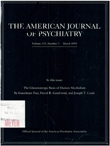Lymphocyte cholecystokinin concentrations in panic disorder
Abstract
Since cholecystokinin (CCK) is known to be anxiogenic in experimental animals and to induce panic attacks in humans, lymphocyte CCK-8 concentrations were measured in 15 patients with panic disorder and 15 age- and sex-matched healthy subjects. The patients' levels were measured again after a 30-day course of alprazolam therapy, 1.5 mg/day. The CCK-8 concentrations were significantly lower in the patients than in the control subjects and did not change after alprazolam therapy. There was no correlation between the peptide values and levels of anxiety or frequency and severity of panic attacks.
Access content
To read the fulltext, please use one of the options below to sign in or purchase access.- Personal login
- Institutional Login
- Sign in via OpenAthens
- Register for access
-
Please login/register if you wish to pair your device and check access availability.
Not a subscriber?
PsychiatryOnline subscription options offer access to the DSM-5 library, books, journals, CME, and patient resources. This all-in-one virtual library provides psychiatrists and mental health professionals with key resources for diagnosis, treatment, research, and professional development.
Need more help? PsychiatryOnline Customer Service may be reached by emailing [email protected] or by calling 800-368-5777 (in the U.S.) or 703-907-7322 (outside the U.S.).



